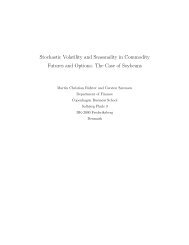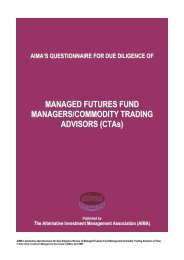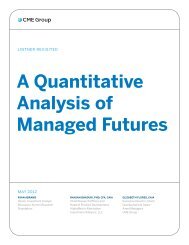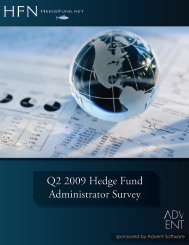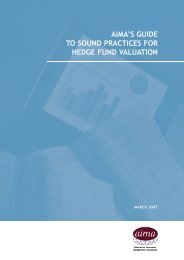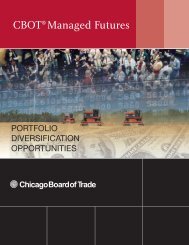SETTING UP A HEDGE FUND â PART TWO - BarclayHedge
SETTING UP A HEDGE FUND â PART TWO - BarclayHedge
SETTING UP A HEDGE FUND â PART TWO - BarclayHedge
Create successful ePaper yourself
Turn your PDF publications into a flip-book with our unique Google optimized e-Paper software.
Public, Private and Professional Funds in the BVI<br />
The Mutual Funds Act 1996 (as amended) of the British Virgin Islands was introduced in January 1998.<br />
Under the Act, funds are categorized into three different types - Public Funds, which must be ‘registered’,<br />
Private, and Professional Funds, both of which must be ‘recognized’.<br />
In simple terms a Public Fund is, as the name implies, a fund that is sold to the public - effectively a retail<br />
fund. It goes without saying that the requirements and restrictions for registering such funds are more<br />
onerous than the requirements for recognizing a Private or Professional Fund. However, they are not as<br />
difficult to comply with, as would be the case in Ireland or Luxembourg.<br />
A Private Fund is one, which is restricted to no more than fifty investors, or one, which specifies that it is<br />
to be offered to investors on a “private basis” - a Private Placement. It must be noted that a clear definition<br />
of a “Private Placement” has not been made under the Act, however guidelines published by the regulatory<br />
authorities in the BVI shortly after the Act came into force indicates that an offering to as many as three<br />
hundred persons could still be regarded as being on a “private basis” and, furthermore, such an offering<br />
should be to prospective investors who have been identified before the fund is launched.<br />
Therefore, although there are some grey areas within the definition of a Private Fund, the one certain way<br />
of ensuring that the fund is deemed a Private Fund is to comply with the limitation to fifty shareholders.<br />
A Professional Fund is one that is only offered to “Professional Investors” and where the majority of<br />
investors subscribe not less than US$100,000 (or currency equivalent).<br />
A “Professional Investor” is one whose ordinary business involves the acquisition or disposal of property<br />
of the same kind as the property (or a substantial part of the property) of the fund. ‘A Professional<br />
Investor’ can also be a person who has signed a declaration that he (or she), either individually, or jointly<br />
with his or her spouse, has a net worth in excess of US$1,000,000 (or currency equivalent) and that he or<br />
she consents to being treated as a professional investor.<br />
Closed Ended Funds are not regulated in the BVI, but may not use the word “Fund” in their name.<br />
Single Investor Funds are exempted from regulations.<br />
It should be noted that if a management or investment management company is established in the BVI,<br />
then that company will also have to be licensed under the Act. If the company has been established purely<br />
to act as manager or investment manager of certain identifiable private or professional BVI funds, then<br />
compliance with the regulations is simpler than would be the case if the entity were acting for a Public<br />
Fund or wished to act for an unrestricted number of funds.<br />
For further details of the Mutual Funds Act, 1996 (as amended) of the British Virgin Islands, please see<br />
the separate section on the Custom House Website.<br />
Licensed, Administered, Registered and Exempted funds in the Caymans<br />
The Mutual Funds Law of the Cayman Islands, which was introduced in 1993 and revised in 1996 and<br />
1999, characterises Mutual Funds as either “Licensed”, “Administered”, “Registered” or “Exempted”<br />
Funds.<br />
A Licensed Fund is a fund that has a Mutual Fund Licence and also, either has a registered office in the<br />
Cayman Islands, or, in the case of unit trust, has as its trustee a trust company licensed under the<br />
Cayman Islands Banks and Trust Companies Law. The Cayman Islands Monetary Authority, which is<br />
the issuer of such licences, is responsible for the supervision and regulation of Mutual Funds and<br />
Mutual Fund Administrators. Before issuing a licence, the Cayman Islands Mutual Fund Authority<br />
(CIMA), will carry out appropriate due diligence and satisfy itself that all parties involved with the fund<br />
are fit and proper persons, of sound reputation and also have sufficient experience and expertise to<br />
carry on the business of the fund.<br />
An Administered Fund is a fund, which has appointed a Licensed Mutual Fund Administrator, to<br />
provide its principal office in the Cayman Islands. The Licensed Administrator takes upon itself the<br />
responsibility to confirm and satisfy itself that all of the persons involved in the promotion,<br />
management and administration of the fund are suitable, fit and proper, have sound reputation and<br />
sufficient experience and expertise. Where a Licensed Administrator takes on this responsibility it is<br />
not necessary for the fund to be separately licensed by the CIMA.<br />
7



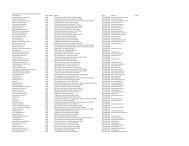
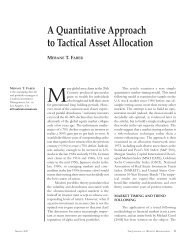
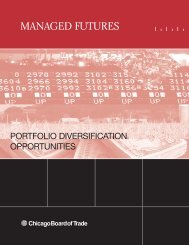
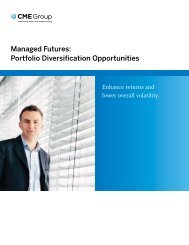
![Definitions & Concepts... [PDF] - Cycles Research Institute](https://img.yumpu.com/26387731/1/190x245/definitions-concepts-pdf-cycles-research-institute.jpg?quality=85)
